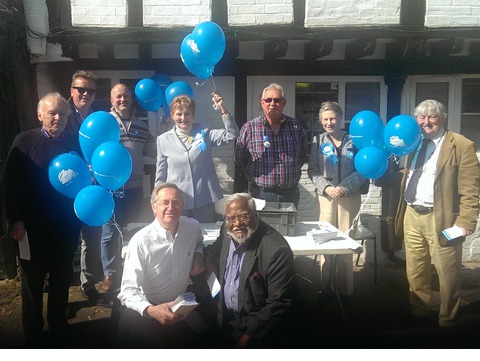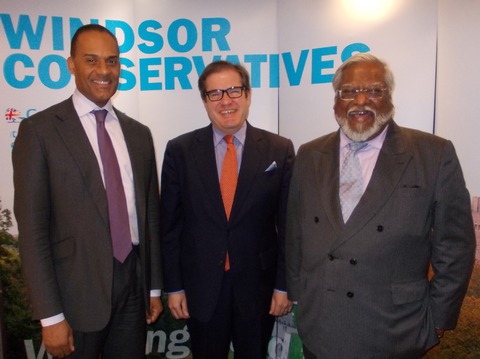| | | |  |
Dear Friend,
UK turnout at the 2009 European Election was 34%. There was almost as many votes cast in the TV series of X Factor as there were for your political representatives in the European Parliament, the parliament which now makes 70% of the laws you live under. Such manifest disregard among the British voters would suggest these elections are seen as a superfluous distraction from the ‘real’ politics of Westminster. Indeed, many Conservatives activists see the European elections as something of a free hit, a final chance to express disapproval with our Party’s leadership before returning to the fold for the 2015 general election with no harm caused.
I have to tell you that this year’s European elections are not superfluous; but critical to the future of our Party and to the future integrity of our country, the United Kingdom.
It is critical that we deliver a staunch showing in the upcoming elections if we are to ensure that Britain is not left unguarded and unrepresented in Brussels, victim to the destructive and all too binding legislation of encroaching ‘Unionists’ and the Left. The European elections will prove to be a decisive stepping stone towards the general elections next year. It is our responsibility not to allow the pyrrhic success of UKIP to destroy our long awaited chance at a say on Europe. The Conservatives remain the only party both intent and capable of delivering a concrete referendum on the future of our country, but if we hope to seize the moment we must be willing to fight now, so that we enter the general elections from a position of strength.
For many years, I have worked with like-minded colleagues such as Dan Hannan in campaigning for an in/out vote. We reject the notion of ‘ever closer union’ and seek the creation of a common market, not a common country. We now have from David Cameron a feasible plan and timeline to achieve this, but it can only be realised by a strong showing in 2014 leading into the general election. To secure our referendum and the right to determine our own future, we must begin the fight now, not next year, not next election, now!
With best wishes,
Nirj
|
| |  |
In the past month my campaign schedule has taken me from AGMs in Mole Valley, Surrey Heath, Brighton and Hove, Windsor; to campaigning in Godalming, Fleet, Reading, Wokingham, Leatherhead and Oxford. Conservative activists often ask me for a succinct, positive message to deliver on the doorstep. While Farage and co. indulge in the pub and self-promotional media appearances, Conservatives MEPs are fighting hard for British interests, delivering tangible results:
-A lower EU budget. Many naysayers dismissed David Cameron’s attempts to reduce the budget in the same way they dismiss his plans for renegotiation. Yet in truth, David Cameron delivered something no British Prime Minister has ever achieved, a substantial cut of £30bn from the EU budget which we have fought to secure through the Parliament.
-A definitive in/out referendum. Whether one wishes to remain in a reformed EU or prefers to leave, giving the British people the final say is the only conclusive way to end the uncertainty surrounding our membership. The Conservative party is the only major party that can secure a referendum.
-Benefit restrictions on migrants. Free movement of labour was never intended for free access to foreign welfare systems. That is why we have restricted EU immigrants’ access to benefits including housing and our health services. Furthermore, we our committed to reviewing the application of EU migration laws to prevent similar issues with future EU member-states.
-Safeguards against Eurozone encroachment. One of the last acts of the previous Labour government was to sign British taxpayers up to the Eurozone bailout fund, forcing the UK to contribute millions to the bailouts of the failed Euro project. Conservatives have now removed the UK from that fund and are establishing further protections for Britain from the interference of unwanted Eurozone financial regulation.
-Powers back from Brussels. In 2013 we reformed the EU fisheries policy to end the wasteful policy of discarding fish and decentralise the decision making process to local fishing communities. This is just one of the policy areas where we are committed to reasserting national control.
|
| | | Strasbourg
Highlights – reporting back from the plenary session
The Deva Report: promoting property rights in the developing world
For the past two decades the overriding perception has been that only by sending money to poorer countries can we eradicate poverty. Of course, when people are starving or have no clean water, we have a duty to step in. However, our aid will never be enough so we have a duty to ask how the EU budget can assist countries to become self-reliant property-owning democracies.
I was delighted to see my report pass with a large majority comprising of cross-party support. The chief objective of the Deva report is to enable the European Commission, the World’s biggest aid donor, to make the development of property rights a major priority for EU funding and support such as through surveying land, training in land management, and processes for registering land.
Extra-legal and unregistered wealth in the developing world is now valued at 9.3 trillion US Dollars, a sum 93 times larger than the total amount of aid delivered to developing countries over the last 30 years. Putting in place a legal framework that would formally recognise the ownership of private assets would allow entrepreneurs to borrow against their homes in order to start or grow businesses, employ people, and generate growth. Such a policy would help break the dependency of certain countries on Western aid.
A house in many African nations is mere bricks and mortar; but with a piece of paper and the right legal framework, that house can become a major security that banks will lend against. Across the Western World, entrepreneurs literally bet the house on great ideas, which create growth and jobs. If this is not possible in poorer countries then the only way they can survive is through foreign aid. Because nobody has a stake in generating that wealth or furthering the economy of that country, the aid is susceptible to corruption.
Property rights must be placed at the forefront of a reformed EU development policy designed to empower people in developing countries to invest sustainably in their own future, that is what my report sets out and that is what I will continue to campaign for.
|
| NSA spying allegations
The EU witch-hunt against the USA continues, and in doing so puts at risk not only our security from external terrorist threats, but also our economic recovery and the much delayed EU-US trade deal. Despite the EU having no mandate over matters of national security, a self-appointed inquisition has spent the last six months perpetuating the allegations of Edward Snowden (now living in Moscow at the pleasure of Mr. Putin) that the US intelligence agency, the NSA, engaged in the mass surveillance of EU member-states and its citizens.
The committee of inquiry has not delivered any conclusive proof but has suggested a raft of measures that would give the EU increasing authority over national security, including the suspension of counter-terror agreements with the USA and a stipulation that any EU-US trade deal would only be ratified if the USA fully complies with EU human rights law.
My Conservative colleagues and I will continue to oppose this report and to fight against the machinations of those in the European Parliament who would willingly burn the extensive ties we have with the USA.
|
| Data Protection Legislation
The
November plenary session saw the discussion of a report related to the
EU’s common defence policy (CSDP). The report argues for greater
harmonisation of EU defence policy, pooling of Member States' budgets to
fund military operations - including expanded common costs of EU
battlegroups - and permanent structured cooperation.
This
represents one of the most disturbing elements of the push for
federalisation, the desire for a single, coordinated EU military force,
answerable not to national legislatures but instead subservient to the
European Commission. It would be far better for all of Europe if the EU
spent less time playing soldiers and instead more time seeking to
redress the economic storm its own destructive policies have created.
As our defence & security spokesman Geoffrey Van Orden pointed out,
not one of the CSDP’s current missions stands up to critical scrutiny;
the police training mission in Afghanistan has largely failed while the
mission to Kosovo has overseen a widespread increase in corruption and
organised crime.
Defence and security policy is and must always
remain a solely national concern; my colleagues and I shall not
compromise the integrity of our armed forces purely to appease the
sycophantic ambitions of EU federalists.
|
| Anti - Money Laundering Legislation
The current money laundering law is no longer fit for purpose. Its blanket approach rather than risk assessment, coupled with the technological advancement of financial criminals has rendered the law ineffective whilst also unnecessarily burdensome upon legitimate businesses and transactions.
The new Anti-Money Laundering legislation will work on the basis of assessing risks, so that the majority of people who transfer money or set up businesses are hardly affected by it. However, it will also shine a light on those using fake companies to deposit money, or disguising assets; and it will require more information to accompany the transfer of funds, in line with new international standards.
This directive will bring the law up to date with the technological developments that have previously made it much more difficult to identify cash related to terrorism, trafficking and corruption.
|
| | | | | I will be back in touch with you again very soon. In the meantime you can check my website www.nirjdeva.com for regular updates and if I can be of any assistance to you on anything raised here or anything else for that matter, please do not hesitate to contact me at nirj.deva@europarl.europa.eu.
|
| | | | | | |